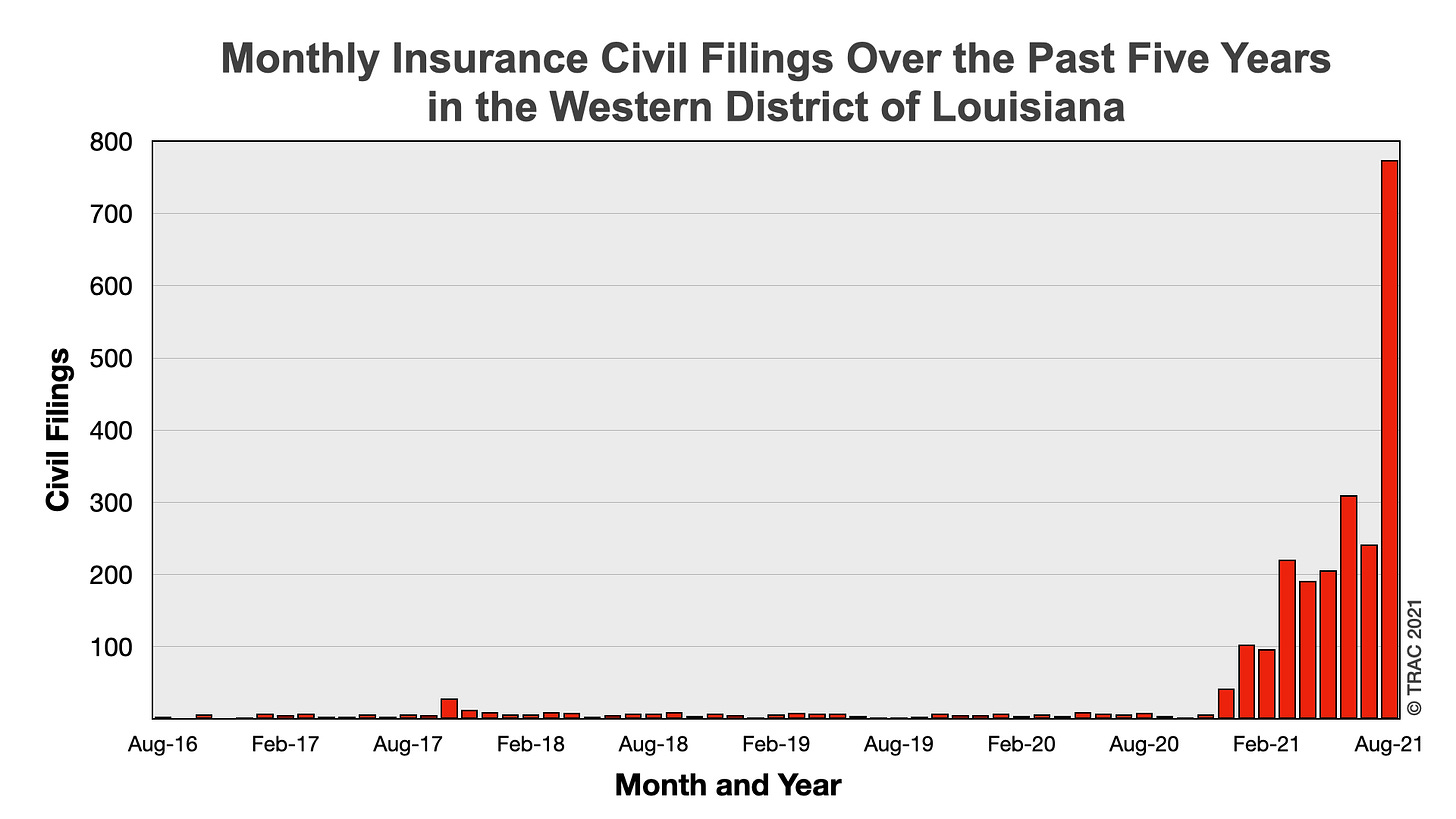My First Edition of "Behind the Report"
Based on a report we released just today, communities already devastated by severe weather events caused by climate change often have to take their insurance companies to court just to get what they are owed so that they can rebuild their lives.
For example, our data on civil litigation in federal court shows that people in Lake Charles, Louisiana have filed more insurance claims in court than any other community in the country, which has helped drive up insurance lawsuits to the highest point in at least a decade.
Here’s the Report: One Year After Hurricane Laura, Louisiana Plaintiffs Rush to Meet One-Year Insurance Filing Deadline in Federal Court
I want to take a moment to do something I’ve wanted to make a habit for my readers: give you an inside look at how we went from idea to published report in less than 24 hours.
We at TRAC get data on the federal courts through PACER, the system for tracking civil litigation. This data is organized and stored systematically so that we can analyze it. Once a month, when we release updated monthly data, we also write a short report to go along with it so that people have some insight into new trends.
Yesterday (Thursday) we received and processed the new data, and then it fell on me this week to do the analysis. I poked around a little to see if there were any interesting trends. It’s not magic, really, it’s just about being curious about the data. I noticed that there was a slight increase in civil litigation, and by drilling down into that data, found that one of the key growth areas was from insurance-related lawsuits.
Those lawsuits weren’t taking place just anywhere. They were heavily concentrated in the Western District of Louisiana. I didn’t know that this was where Hurricanes Laura and Delta came ashore last year. We’ve had a lot of hurricanes in the U.S. recently, and I’ve only kept track of ones closer to me in New York State and New England. So it took some time looking at the documents associated with these cases to realize that these cases even had anything to do with hurricanes.
What I found from those court documents was that residents in the Lake Charles area of Louisiana were being forced to sue their insurance providers after insurance companies either didn’t compensate their clients for the hurricane damage or provided a fraction of what was required for residents to rebuild their homes and their businesses. I thought this was remarkable and tragic, and worthy of a short report.
After additional digging around on my own, some fantastically quick and smart responses from our team of interns, and a phone call to a generous legal assistant who was working on these hurricane cases, I started to understand what was really going on. According to most of the insurance contracts, residents had one year from the date of the event to contest the insurance companies in court. This is why we saw such a spike in cases in August in particular.
Although there have been many (many!) insurance lawsuits in this region over the past year due to two hurricanes, a freezing winter storm, and flooding, August 27, 2021, was the one-year anniversary of Hurricane Laura making landfall. As a result, people rushed to file lawsuits in court before the deadline. The legal assistant I spoke with told me they had filed over 100 lawsuits at once just to make sure their clients met the deadline.
At that point, I had a pretty good sense of what the report needed to say. We needed to show the data in a few different charts and tables to make sure that the public had a complete picture, and we needed to explain the increase by describing the one-year deadline issue.
We focus narrowly on the data itself and we don’t get into editorializing or adding qualitative research. But that doesn’t mean that the research isn’t important. It’s very valuable to have a sense of why the data looks the way it does and we do our best to point readers to additional information in the footnotes when possible.
With the report complete at about 10:00 pm last night, I sent it off to my colleagues. This morning we went through several rounds of fact-checking to make sure that the numbers were all 100% accurate and consistent, ensured that everything was true and factual, tested the links, conducted several line edits, made a few changes, and finally hit “publish.” Let me tell you: it feels great to be able to play a small role in highlighting this very important barrier to recovery facing residents in Louisiana.
The spike in insurance lawsuits in Lake Charles isn’t just about the numbers, it’s about the thousands of people who are still struggling to put their lives back together after a devastating year and who are now facing even more hurdles with insurance companies. For their part, the Western District of Louisiana appears to be taking these cases seriously and has created a process for expediting these cases even as their own courthouse in Lake Charles was hit hard by the storm. This is yet another example of how the growth of more severe and unpredictable weather events that come with climate change can impact our federal courts.
Reports don’t always come together that quickly. More complicated reports take much longer to write and validate. But in this case, the report came together quickly and we were able to release it by the end of the week.
Thanks for reading. If you like this “behind the report” concept, let me know and I will do more of them.




